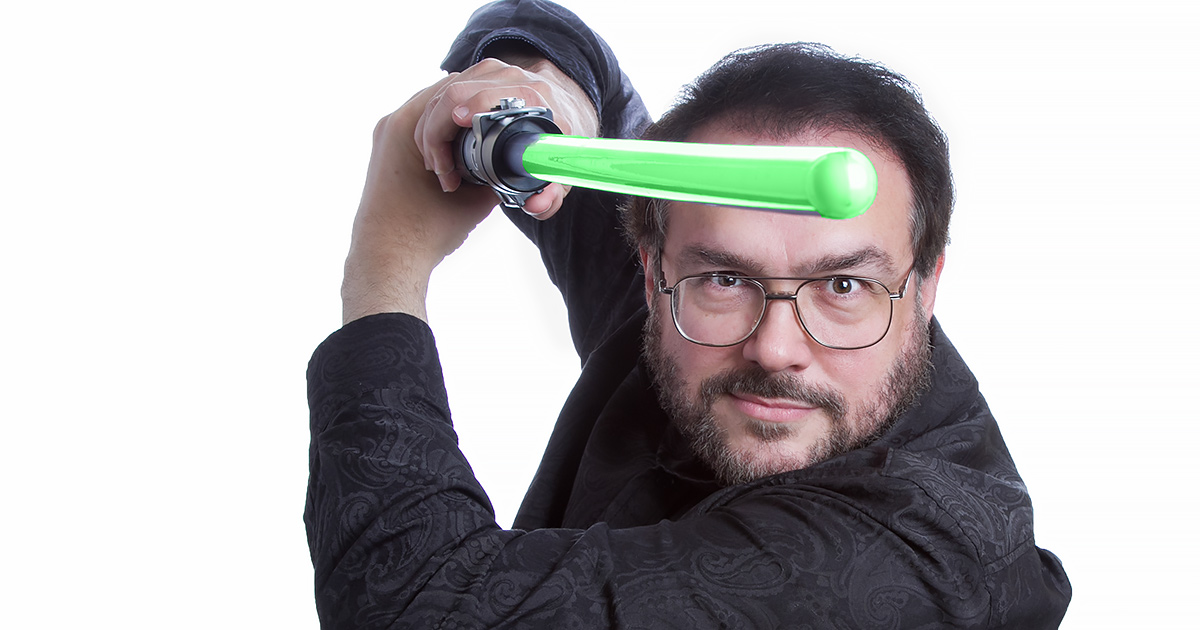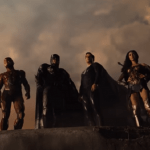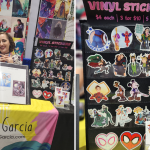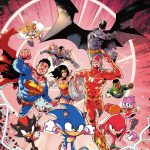Academia & Geekery: A Chat with Travis Langley
San Diego Comic-Con is a place for nerds to gather and talk passionately about all the geeky things that excite us. One such fabulous nerd is the psychologist and author Travis Langley, who has written numerous books analyzing various geeky properties from a psychological perspective.
As a Film & Digital Media graduate, looking at pop culture and entertainment academically has always been important to me. I founded this website as an outlet for myself and other analytical geeks to talk about this kind of thing. So needless to say, the work Travis Langley does is super appealing to me. When I had the chance to sit down with him at San Diego Comic-Con, I jumped at the chance.
The next book you have coming out is the one for Westworld. That’s in November, correct?
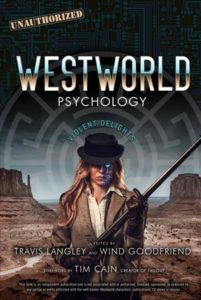 Travis Langley: Yes.
Travis Langley: Yes.
So, I was wondering if you have others planned, or is Westworld kind of the one that’s taking up all of your focus right now?
Travis Langley: The focus has been Westworld, right. And we know what the two books after that will be. I can’t say yet, but it’s comic book related stuff. And one of them is one people have been asking me about for years and we’re finally going to do that to come out later in 2019. People who check movie schedules might figure out what I’m talking about.
Some of them we think a bit ahead, some of them we go “Ooh! We have this idea”, but man for when people would want to buy it, we need to push ourselves for this one. So, some of them have a lot of lead time. I like the fast pace. I like it when we have four months to put this book together. And even when we do that, it’s things we have thought about for years.
My first book was BATMAN AND PSYCHOLOGY: A DARK AND STORMY KNIGHT. I’m the sole author on that one. But then we made the deal for the subsequent books, the anthologies, which I’m the editor and the lead writer, the head nerd of the herd. So, I’ve got other psychologists, other trauma experts, child psychologists, forensic experts bringing different areas and different knowledge and expertise to them. We had the proposal for the series with Star Wars and The Walking Dead as the main topics we’ve talked about, and the publisher came back at the beginning of the series, can you do them both? With four months for The Walking Dead and Star Wars coming in two months after that. So, that meant six months for Star Wars and I was like yeah, we can do it.
It was things we had been thinking about for a really long time. I love the fast pace, but I always wonder someone is writing for somebody, like one of the upcoming books, our manuscript will be due about the time the Westworld book is published. I am going to have to make sure who’s writing what for this book and recruiting people who haven’t been working with us; okay, you have three months to get it done! And not everybody is going to agree to do that.
I like the pace. I like throwing myself into it. It drives my wife crazy sometimes. But that’s what I enjoy. And Westworld, the first season of Westworld, we talked about it during that season because we were loving the season. And at the end of the season we went through possible topics and we realized then, to my surprise, we already have enough to fill a book on the psychology of Westworld from one season alone. We had extra topics, too.
Still, we took time with the production schedule and all, and if it can’t come out before season 2, we want to include season 2. So, the manuscript was due a week after the end of season 2. We already had most of it written. The first and last chapters talk a lot about season 2, and at other points we talk about some key things, some interesting things happen in season 2.
Did season 2 change anything in the book?
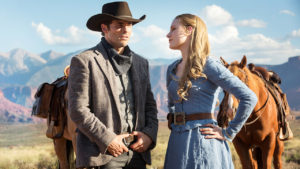 Travis Langley: There were a couple of things. Not big things, though. Not in terms of big picture topics, because it didn’t have any effect on the kind of real world psychology we have been talking about. With the things going on in season 1, we talked about them. Season 2 added some things. Fleshed some things out.
Travis Langley: There were a couple of things. Not big things, though. Not in terms of big picture topics, because it didn’t have any effect on the kind of real world psychology we have been talking about. With the things going on in season 1, we talked about them. Season 2 added some things. Fleshed some things out.
What kind of audience is this for?
It’s a geek website… TV, movie, comics.
Travis Langley: Spoiler alert folks! When it is revealed that Dolores saying she built Bernard rather than Ford building Bernard, I did tell my writers several of you have references to Ford creating Bernard and you need to go back and tweak how you say that, or in one case make a big change in what’s going on there. I actually wrote a bit about comparing this Dolores and Ford. Ford has a history of taking some credit for things other people have done. Back in season 1 when he’s talking about “I made you” and Bernard says that “no! The most elegant parts of that code did not come from you.”
When it comes to deciding what book you are going to write next, do you just kind of go based on what you are currently interested in or is there something else that inspires the topic to write about?
Travis Langley: We have three main things. First, what’s interesting to us that we like thinking about, that we like analyzing. And then of those things, what can we bring real psychology to. There have been a couple of topics we have batted around that we aren’t sure about filling a book on. Like Deadpool.
Deadpool is fun. Wonderful to analyze. You can fill a book with a wide variety of topics with Deadpool. I can see doing that as part of something. I may have now said this and inspired somebody to slap it together since they know I’m NOT doing it now.
We’ve talked about that. We say that could probably be one of our bestsellers. But it doesn’t fit us having the criteria of having the breadth of psychology and variety of real human nature to talk about?
And then what would the publisher let us do? And they’d like to have the book come out. Is there some kind of real world event going on to tie things to? Is there a movie release coming up? That’s part of what’s determining our next two topics.
One of them, we had originally talked about maybe doing it three years later, and I said there’s this event in early 2019 that would be a good time for us to do that one. So, the timing has more to do with that sort of stuff.
It’s… What’s on our mind now? What do we want to talk about? And yeah, what will somebody buy? Because the publisher doesn’t want to do it.
From the academic perspective, you are still teaching classes right now, so, when it comes to the makeup of classes about this topic, is it mostly psychology majors or is it a kind of a mix of people that come from the film side of things, the creative side of things?
Travis Langley: It’s a mix. It is a mix. There have been several communication majors, film majors, who then went on to minoring in psychology because they’ve enjoyed that. I think of those students it tends to be some who’ve had some psychology. And if they hadn’t had at least general psych, that can still work because even these books are aimed at people who haven’t had studied formal psychology, but we all talk about psychology all the time, whether we realize it or not.
Psychology is not just about therapy. It’s not just about mental illness. It’s about everything we do. And when you say what did that person do that? You’re asking a psychological question. When you speculate on why they did this or what they will do?… Or is that in character? You’re talking about psychology.
So, somebody who hasn’t had psychology I caution them, okay, there maybe be some concepts you might have more trouble with, but it is still meant to be where anybody can use this stuff to understand these things. It seems to have worked very well.
I had actually started with a psychology in literature course. The professor who taught it had retired. And I thought, well, I’ll take a stab at this. This was eleven years ago. And it also happened to be the first summer I came to San Diego Comic-Con. And that was like a second lit course and students were analyzing characters like Hamlet and Ahab and a mix of others. And I had them read The Killing Joke, a Batman graphic novel. And what I discovered is that, okay, it was exciting and interesting to them, and they were learning a lot of psychology. To their own surprise, they were learning more about the science of human nature than they’d realized. It became an excellent way to review these things. And I just saw the strength of this as a tool.
When I came here for the first time and attended some of the more scholarly panels and saw people talking about those things, I kept thinking about the strength of what we’re doing. It’s fun analyzing the characters and thinking about this. And some people hear what we do and think that sounds pretty frivolous, analyzing Batman. But when you analyze Batman, when you analyze synthetic people in Westworld, when you analyze people being scared of a dragon in Game of Thrones, when you’re thinking about them you’re looking at them in terms of real human natures. What they’re doing true to human nature. And therefore by looking at them you are also looking at human nature.
I have a Bachelor’s degree in film and considered minoring in psychology but I ended being not able to do that, and that’s kind of funny that you mentioned there’s a big crossover.
Travis Langley: Yeah! They are heavily interrelated. If somebody is going through analyzing film even… if they’re looking at the story, of course, it is a little more obvious. But when they’re looking at the film technique and the design, the shadows, you’re still talking about what appeals to people in terms of sensory experience, emotional experience, they’re still talking about psychology.
Earlier you touched on something that I want to ask about. When I write about these topics, because I have a blog, sometimes I get a little bit of pushback, like, from the academic community that these are not serious topics or whatever. So, I’m wondering did you encounter that kind of pushback? Because you’re very successful in this field. But I’m wondering if you’ve experienced what some of us have?
Travis Langley: I’m fortunate that the university that I am at, the administration is very supportive of creative ways of teaching. Another professor, a Communications professor, Randy Duncan, had been talking about these things. He was teaching a psychology as communication course there… he was the advisor for the comic book club long before the legion of nerds emerged and I’m their advisor, the largest organization of campus.
I owe so much to Randy. He doesn’t know yet, but there’s a book… he’ll know before the end of this weekend that’s why I’m okay saying it. I dedicated my Daredevil book to Randy because of him paving the way on these things. And he made it easier at the university. There are administrators that don’t get what we’re doing. But current administrators, they love what we are doing. The fact that these things have attracted nerdy students to the university. My department chair does not understand the value of it. I think he thinks it is pretty frivolous. But he still gives me the freedom to do what I am doing. If I want to teach about Batman in a class in the Spring, he lets me.
You’ve written books about a lot of different fandoms like Batman, Supernatural, Star Wars… when you engage with these fandoms, is there a particular fandom you particularly enjoy engaging with?
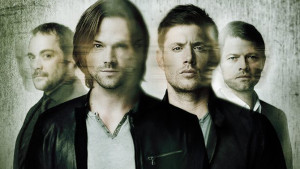 Travis Langley: Supernatural! I mean, the fandoms, these different fandoms. Anything’s that’s a fandom you already have this collection of people. But Supernatural, there is no fandom that’s the same as Supernatural in terms of not just the excitement of fans, but this two-way relationship. There’s the cast, the creators, and all of them, and the fans. It is a two-way relationship.
Travis Langley: Supernatural! I mean, the fandoms, these different fandoms. Anything’s that’s a fandom you already have this collection of people. But Supernatural, there is no fandom that’s the same as Supernatural in terms of not just the excitement of fans, but this two-way relationship. There’s the cast, the creators, and all of them, and the fans. It is a two-way relationship.
There are people who work in Star Trek who have something of two-way relationship with fans. Chase Masterson, a friend of mine, she was on Deep Space Nine, she actually has a larger fan club than Patrick Stewart because of how interactive she was and it being a very genuine thing, not talking at them. You’re not having a two-way relationship with William Shatner.
But Supernatural, it’s very much… there’s something that ties everybody together in a way. I’ll say that you can’t find another fandom that has that same kind of family feel. And the show is very much about family that don’t end in blood.
I agree.
Travis Langley: That’s grammatically correct in the sense of Supernatural. For those of you who don’t know.
Do you have anything else you want to add?
Travis Langley: Live long and prosper.
Fantastic!
Author: Angel Wilson
Angel is the admin of The Geekiary and a geek culture commentator. They earned a BA in Film & Digital Media from UC Santa Cruz. They have contributed to various podcasts and webcasts including An Englishman in San Diego, Free to Be Radio, and Genre TV for All. They identify as queer.
Help support independent journalism. Subscribe to our Patreon.
Copyright © The Geekiary
Do not copy our content in whole to other websites. If you are reading this anywhere besides TheGeekiary.com, it has been stolen.Read our

